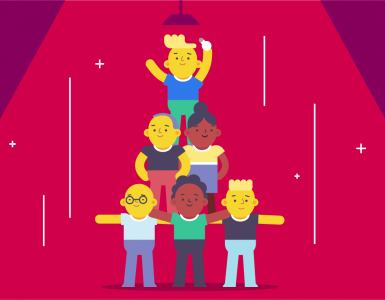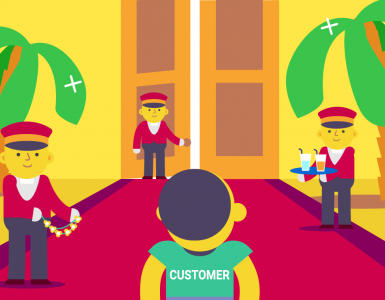There’s no doubt, nothing in today’s work environment is ordinary. It’s a fast-paced, interconnected, and hybrid workplace. That’s why collaboration is the recipe for a successful team.
Effective teamwork is the cornerstone of high-performing organizations. It allows them to innovate, adapt, and achieve their goals. But what does it take to build a genuinely collaborative team?
The answer lies in cultivating essential collaboration skills that:
- Empower individuals to work together seamlessly
- Leverage their diverse strengths
- Achieve collective success.
Are you a team leader, manager, or HR professional looking to build a high-performing team that consistently delivers results?
Well, you’ve come to the right place.
In this comprehensive guide, we’ll share 11 essential collaboration skills that can transform your team’s dynamics and how to foster and develop those skills and unlock your team’s full potential.
What are collaboration skills?
Collaboration skills encompass a wide range of abilities that empower individuals to work effectively with others toward a common goal. These collaborative skills go beyond merely completing tasks together. They involve:
- Fostering a culture of open communication
- Resolving conflicts constructively
- Embracing diverse perspectives
- Building trust
In short, collaboration skills are the building blocks of a cohesive and high-performing team.
11 Essential collaboration skills for effective teamwork
Let’s start with the basics. In this section, we’ll explore 11 essential collaboration skills that translate to effective teamwork.
While most of them are soft skills, at least one involves technical knowledge critical in a digitalized society.
1. Communication skills
Clear communication is the basis of any successful collaboration.
Communication skills involve:
- Expressing ideas clearly
- Actively listening to others
- Asking clarifying questions
- Providing constructive feedback
You can’t have strong collaboration skills without proper communication. The goal of effective communication is to make sure that:
- Everyone understands their roles and responsibilities
- Everyone is on the same page and can work together towards shared goals
It also helps to prevent misunderstandings, resolve conflicts, and build trust among team members. When communication is clear and transparent, team members feel more included and valued, which increases engagement and productivity.
Regardless of your communication style, communication skills are the bedrock of nearly all other relevant skills for the collaborative process.
2. Active Listening
Active listening goes beyond simply hearing what others say. It involves:
- Paying full attention
- Understanding the underlying message
- Responding thoughtfully
While active listening is an integral part of communication skills, it deserves its seat at the table because of how vital yet unappreciated this skill is.
Active listening builds trust, strengthens relationships, and promotes a deeper understanding of different perspectives within the team.
Encourage active listening to remind your team to:
- Focus on the speaker
- Avoid interrupting them
- Ask open-ended questions
- Summarizing their points to make sure they fully understand them
Incorporating active listening in virtual meetings is especially important to ensure that remote team members feel heard and valued.
3. Emotional intelligence
Emotional intelligence (often abbreviated as EI) is about recognizing, understanding, and managing our emotions and those of others. It’s one of the most important soft skills in management, leadership, and collaboration.
Building a High EI enables individuals to:
- Navigate interpersonal dynamics
- Resolve conflicts amicably
- Build strong relationships with their team members
It also helps avoid emotional outbursts that could damage relationships within a team.
Thankfully, as a communication skill, anyone can learn and develop their emotional intelligence. The most common way is through workshops or training programs on emotional awareness and empathy.
Leaders with high EI foster a positive team culture, which in turn, supports employee retention and long-term collaboration success.
4. Proficiency with collaboration tools
Collaboration today often relies on various online software tools and platforms like Chanty, Slack, and Basecamp. Proficiency with these tools is an essential technical skill for effective communication, project management, and knowledge sharing.
Chanty
All modern collaborative workplaces rely on these tools to manage collaborative projects across the globe. The goal is to provide a seamless way for remote workers and in-office works to communicate.
Tools like Chanty bridge the gap with remote teams through voice and video conferencing features, allowing real-time verbal and nonverbal communication. For example, your team members can:
- Send notifications to the entire team or individual team members
- Communicate asynchronously
- Share files
Additionally, ensure that remote team members use a VPN for remote access to maintain secure connections and protect sensitive information.
Familiarity with collaboration tools helps teams operate more efficiently, especially in hybrid work environments where both remote and in-office members need to stay connected.
The above highlights why it’s essential to familiarize your team with collaboration software tools like Chanty, provide training as needed, and encourage them to use them to their full potential.
Why?
If your team can master these technical skill sets, you’re well-equipped to tackle any challenge and achieve your set goals. As a result, you will drive your organization forward.
5. Adaptability and adaptive learning
Adapting to change and learning from new experiences is another crucial collaboration skill.
As a team, you are bound to face unexpected challenges and setbacks. So, being able to adjust your approach and learn from these situations helps maintain momentum and achieve your optimum success.
It’s generally good advice to encourage a growth mindset within your team. That said, you can also view challenges as opportunities for learning and development.
Even if all else fails, this attitude will serve as a common ground to set the stage for collaboration.
Recognizing the need for improvement, we focused on adaptability and adaptive learning as essential collaboration skills.
By implementing continuous training and promoting a culture of open feedback, our team quickly learned to adjust to new challenges and support one another’s growth.
This approach strengthened our teamwork, enhanced overall efficiency, and sparked innovation, driving our business forward.”
6. Conflict resolution skills
With team members from all different backgrounds and experiences, conflict is an inevitable part of any collaborative environment.
Despite their typically negative connotation, conflicts can often be forces of progress within an organization. It all depends on how team members handle them, which is why conflict resolution skills are so necessary.
Effective conflict resolution skills involve:
- Identifying the root cause of a conflict
- Finding common ground
- Reaching a mutually agreeable solution
Mastering conflict resolution ensures that teams can navigate disagreements without disrupting collaboration, turning potential setbacks into valuable learning experiences.
7. Delegation
Ah, yes, the art of delegation.
That’s right. It’s more of an art (than a science) of assigning each member tasks and responsibilities. The goal is to maximize their strengths and contributions with each given task.
Effective delegation empowers individuals, builds trust, and promotes a sense of ownership and accountability within the team.
Delegation also promotes autonomy, allowing team members to step up and develop leadership qualities while freeing others to focus on higher-level tasks.
In short, delegation is a very practical collaboration skill that helps get the most out of every team member.
8. Teamwork
As cheesy as it sounds, teamwork makes the dream work.
Here’s why. Collaboration implies that we are all working towards a common goal.
To knock this goal out of the park, it will involve:
- Cooperation
- Coordination
- Shared sense of purpose
Strong teamwork skills are a necessity for building a cohesive and high-performing team.
Are you not sure how to identify who’s being a team player and who’s not? Look out for these cues:
- Anyone who likes to bond and get to know other team members on a personal level
- A team member who shares responsibility for successes and failures
- Anyone who fosters a positive attitude when working with others
- Someone who celebrates collective achievements
- An employee who supports team culture
Teamwork extends beyond simply completing tasks — it’s about fostering a culture where collaboration feels natural and everyone contributes to the success of the group.
If you find someone who checks all of these boxes, you’ve found yourself an elite team player.
9. Problem-solving
Another collaborative skill that spawns effective teams is problem-solving. Or, in other words, the ability to identify and resolve challenges or obstacles that arise during a project.
synergogy.com
Effective problem-solving involves:
- Analyzing the situation
- Brainstorming possible solutions
- Evaluating those solutions
- Implementing the best course of action
Problem-solving is not just about fixing issues — it’s about learning from them, so teams become more resilient and proactive in handling future challenges.
10. Critical thinking
It’s good for team members to agree, but that doesn’t mean everyone “has” to agree on everything just for the sake of agreement.
Why?
Everyone has their own opinions. So, allow everyone on your team to exercise critical thinking to reach their conclusions (whether they agree with the rest or not).
Critical thinking is about objectively analyzing information, evaluating arguments, and drawing logical conclusions. It involves:
- Questioning assumptions
- Identifying biases
- Considering alternative viewpoints
Without critical thinking, we risk losing what makes collaboration so powerful: having multiple viewpoints and opinions about how best to address a problem or issue or reach a common goal.
11. Creativity
Finally, we have creativity. Creativity is the skill that allows us to generate new ideas, approaches, and solutions to problems. Most people like to call it “thinking outside the box.”
The goal of creativity is to challenge conventional wisdom and embrace experimentation. Creativity is a valuable asset for any team as it fuels innovation and helps teams find unique solutions to complex problems.
How to build collaboration skills
So, how do you create a truly collaborative team? Let’s touch on a few tried-and-true methodologies for how you can build these skills within your team.
1. Foster open and transparent team communication
Open communication is the key to a successful team.
Why? It creates a safe space for individuals to share ideas, concerns, and feedback without fear of judgment or reprisal.
Encouraging openness also helps to resolve misunderstandings more quickly and builds trust between team members, which is essential for effective collaboration. So always encourage your team members to be open and honest with each other. It’s better to over-communicate than under-communicate. When in doubt, speak up.
As mentioned above, it’s essential in the modern workplace to consider tools that facilitate seamless communication, particularly interdepartmental collaboration.
Communication tools such as Chanty, Slack, and Microsoft Teams can help your team stay connected, even in remote or hybrid working environments, by providing instant messaging, voice and video calling, and file sharing. Now that it has been discontinued, there are other alternatives to Workplace by Meta that provide features designed to enhance team collaboration by streamlining communication, sharing updates efficiently, and improving team engagement.
2. Clarify shared goals and expectations
It’s hard to overstate the importance of clearly defined goals in collaboration. They keep everyone on track and working towards a common purpose.
Make sure that every team member understands the following three things before moving forward on any project or task.
One way to ensure clarity around objectives and foster team communication and collaboration is to conduct meetings with well-crafted agendas.
By having a clear staff meeting agenda that you share before meetings, you’re helping your staff know what to expect, set goals, and stay on the same page, which encourages participation and decision-making.
It also helps you assign action items and promote ownership and accountability.
3. Offer training and development opportunities
Investing in your team’s development is an investment in your organization’s future.
Provide training and development opportunities focusing on communication, conflict resolution, problem-solving, emotional intelligence, and other essential collaboration skills.
Incorporating role-playing into training sessions can be a powerful tool to simulate real-world scenarios and develop collaboration skills in a hands-on way. Provide your team with resources such as workshops, webinars, and online courses to help team members hone their skills.
For example, providing access to platforms such as LinkedIn Learning or Coursera can provide team members with valuable content on leadership, communication, and team collaboration strategies. These resources can help your team navigate the complexities of working together and build confidence in contributing to group discussions.
4. Cultivate a culture of psychological safety
When team members feel they can express their ideas freely and safely, admit mistakes, and challenge the status quo, they’re more likely to contribute their best work and collaborate effectively.
Psychological safety is essential to reduce fear of failure and encourage constructive feedback that can lead to innovative solutions. Create a safe space for open dialogue, recognize and value different perspectives, and celebrate successes and failures as learning opportunities.
Leaders can model vulnerability by admitting their own mistakes and seeking feedback, which helps to build a culture of trust and mutual respect. This openness can inspire team members to adopt similar behaviors, which in turn improves overall collaboration.
5. Celebrate diversity and inclusion
Diversity, inclusion, and the absence of favoritism are critical components of a high-performing team.
Embracing the unique perspectives, experiences, and backgrounds of every team member gives rise to innovation.
Encouraging diverse voices in team discussions allows for a wider range of ideas and problem-solving approaches. Diverse teams have been shown to produce more creative solutions and are better equipped to adapt to changing market demands.
In addition, creating inclusive team-building activities that recognize cultural differences and encourage collaboration across backgrounds can strengthen relationships and foster inclusivity. This helps to ensure that all team members feel valued and respected, further enhancing their ability to work together effectively.
6. Encourage cross-functional collaboration
Cross-functional collaboration means bringing together individuals from different departments or teams with diverse skills and expertise.
This approach can lead to innovative solutions as team members leverage their unique perspectives and knowledge to tackle complex challenges.
You can encourage cross-functional collaboration by creating collaborative projects that require a diverse set of skills. This will create opportunities for team members to share knowledge and learn from each other.
Cross-functional brainstorming sessions, where team members from different backgrounds are encouraged to contribute ideas, are an excellent way to stimulate innovation. Make sure that your team is proficient in using suitable project management methodologies that fit the project’s scope.
Benefits of effective collaboration
Effective collaboration offers numerous benefits for both individuals and organizations.
Enhanced productivity
Collaboration fosters faster problem-solving thanks to diverse perspectives and skill sets, allowing teams to tackle complex challenges more efficiently and find creative solutions.
It also increases efficiency by sharing workload, streamlining communication, and minimizing delays.
Finally, it improves decision-making thanks to the collective input of diverse viewpoints.
Increased innovation
Collaboration sparks new ideas and fosters a culture of innovation.
By combining different perspectives and experiences, collaboration generates a broader range of creative solutions for more effective brainstorming and a higher-quality output.
Improved morale and engagement
It’s not all about productivity; it’s also about quality of life and work environment.
Collaboration helps establish stronger relationships between coworkers, fostering a sense of camaraderie and belonging. Thanks to shared responsibility and support systems or highly collaborative teams, this increases job satisfaction and reduces stress and burnout.
Organizational growth
Collaborative teams are well-equipped to adapt to change and navigate challenges. This ability to adapt fosters a culture of continuous improvement and innovation, giving organizations a competitive edge.
Beyond that, a collaborative work environment is more appealing to top talent and helps retain valuable employees, contributing to your organization’s sustainable growth.
Additional benefits
Apart from the above, effective collaboration also leads to improved communication, increased learning and development, and enhanced problem-solving skills among team members. By learning from each other’s talents and experiences and working collaboratively on challenges, individuals develop their problem-solving abilities, interpersonal skills, and other essential skills, leading to professional growth.
A team is more than a group of people
Building a truly collaborative team requires more than assembling a group of talented individuals. It involves creating (and continually building):
- A culture of trust
- Open communication
- Shared responsibility
Fostering an environment where team members feel safe to express their ideas without fear of judgment is essential. This encourages innovation and empowers everyone to contribute their unique perspectives.
So, bookmark this guide. Share it with your team. Only you can unlock your team’s full potential, drive innovation, and achieve outstanding results.
And remember, collaboration is an ongoing journey, not a destination.
It’s important to regularly evaluate and refine your collaboration processes. By using the right collaboration tools, you can enable your team to communicate more effectively and stay focused on goals. This keeps everyone moving in the same direction and increases productivity.
Continuously invest in your team’s development. Empower them to keep growing as individuals by providing access to the right collaboration and employee training tools. Investing in team-building activities and professional development ensures a well-rounded, engaged workforce ready for any challenge. Celebrate your successes. Always celebrate your successes. And learn from challenges and failures.
Taking it one step at a time helps you create a high-performing team that is greater than the sum of its parts.








